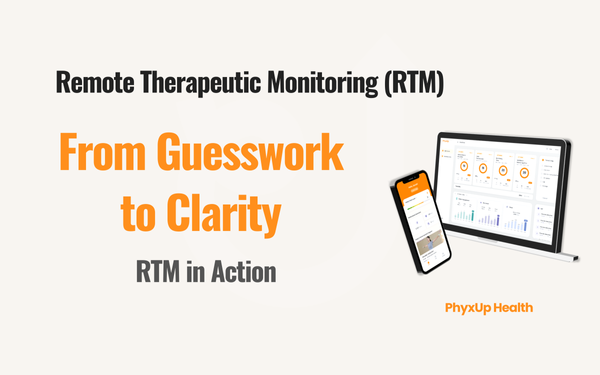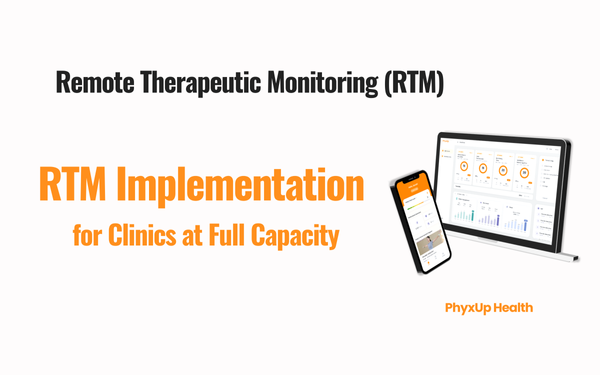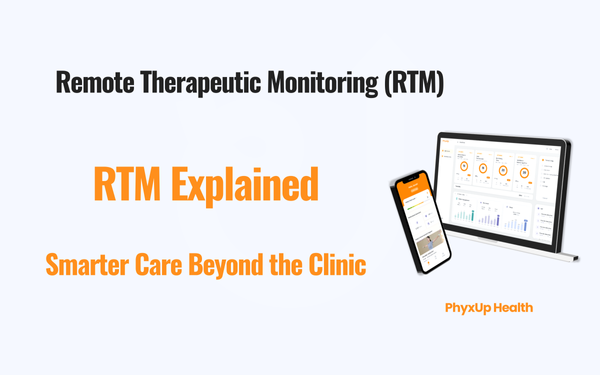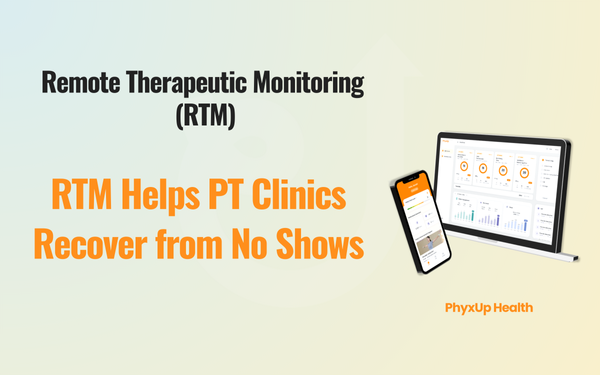Why Remote Therapeutic Monitoring (RTM) is Critical for Improving HEP Adherence
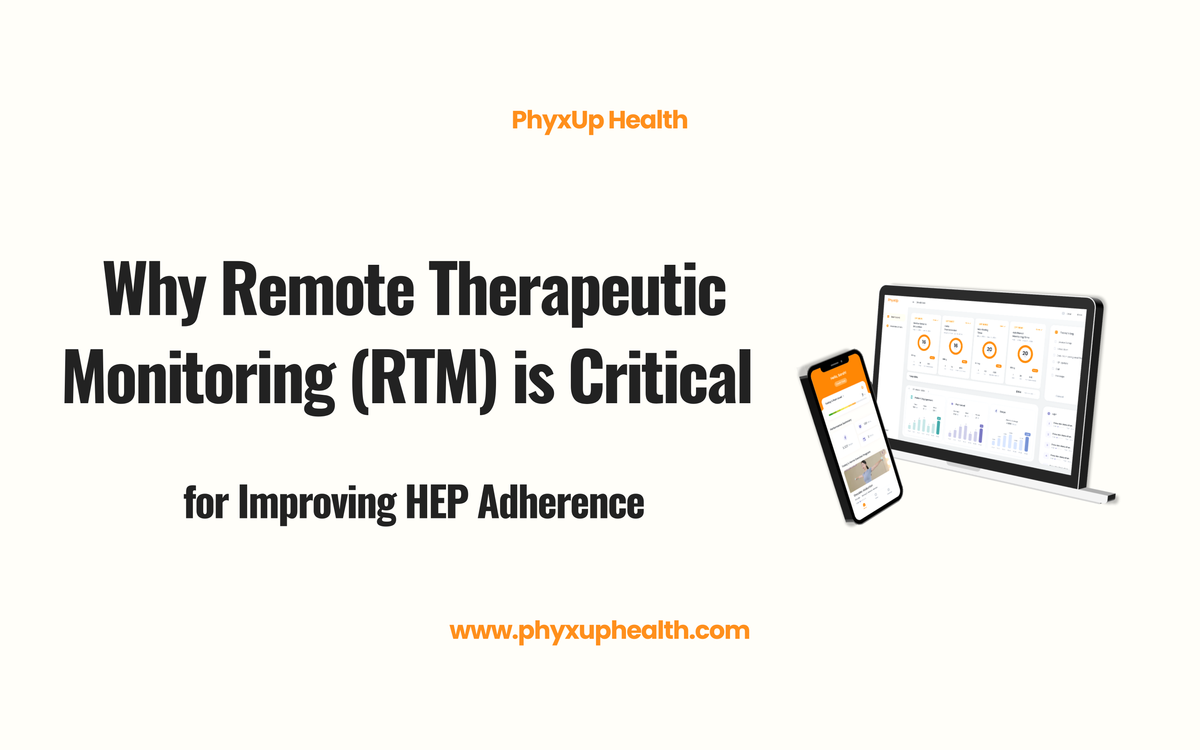
Ensuring that patients stick to their Home Exercise Programs (HEPs) is one of the most significant challenges in physical therapy. Despite the best efforts of both therapists and patients, adherence often falls short, slowing recovery and impacting long-term outcomes. However, leveraging the power of Remote Therapeutic Monitoring (RTM) can drastically improve patient engagement and HEP adherence, leading to better outcomes and enhanced patient satisfaction.
Why HEP Adherence is Critical for Rehabilitation Success
Adherence to HEPs is vital for the success of rehabilitation. Research consistently shows that patients who adhere to their prescribed exercises experience significant improvements.
According to the British Journal of Sports Medicine, patients who follow their HEPs see improvements in strength and mobility by 25-35% over 6-12 weeks. While results vary based on the condition, the potential benefits are clear.
A study in the Journal of Orthopaedic & Sports Physical Therapy found that patients who followed their HEPs recovered 40% faster than those who did not. Faster recovery times not only lead to reduced healthcare costs and lower re-injury rates but also result in increased patient satisfaction.
This lack of adherence results in longer recovery times, higher healthcare costs, and frustration for both therapists and patients. Remote Therapeutic Monitoring (RTM) can significantly address this challenge by keeping patients on track and improving overall HEP adherence.
Common Barriers to HEP Adherence
To improve adherence, it’s important to identify the common barriers patients face when trying to stick to their HEPs. These include:
- Lack of Accountability: Many patients lose motivation without regular follow-ups or reminders. Without consistent check-ins, patients often skip their exercises, reducing the effectiveness of their therapy. Remote Therapeutic Monitoring (RTM) directly addresses this barrier by allowing therapists to track their patients’ progress remotely and send timely reminders, ensuring patients stay committed to their HEPs.
- Physical Discomfort or Fatigue: For some patients, pain, fatigue, or a lack of motivation makes it difficult to stay consistent with exercises. Adjusting exercises to meet patients’ individual needs and offering encouragement is essential. RTM can help by allowing therapists to adjust the program in real time based on patient feedback, ensuring that the exercises remain effective and comfortable.
- Monotony of Exercises: Repetitive or unengaging exercises are a major reason for non-adherence. PhyxUp Health’s RTM platform offers a solution by providing real-time feedback and progress updates, as well as personalized adjustments to HEPs. This not only keeps exercises relevant but also helps patients stay engaged throughout their rehabilitation process.
Best Practices to Improve HEP Adherence with RTM
Here are some effective strategies:
- Educate Patients on the Benefits: It's essential that patients understand why sticking to their HEPs is crucial. RTM enables therapists to provide ongoing education through regular follow-ups, real-time feedback, and visual progress tracking, reinforcing the importance of commitment.
- Set Personalized and Realistic Goals: A personalized HEP tailored to the patient’s specific needs and goals is key to engagement. When patients see measurable progress through the RTM platform, they are more likely to stay committed. Celebrating small victories motivates patients to continue their exercises.
- Leverage Technology for Better Results: RTM technology, such as PhyxUp Health’s RTM platform, makes HEP adherence easier to track and improve. With RTM, therapists can monitor patient progress remotely, provide real-time feedback, send automated reminders, and adjust exercise plans based on ongoing data. This not only boosts patient engagement but also improves clinic revenue through billing for remote monitoring services.
- Regular Follow-ups and Check-ins with RTM: Consistent follow-ups are vital for accountability. With RTM, therapists can stay connected with their patients through remote check-ins. These touchpoints allow therapists to assess progress, adjust the program if necessary, and encourage patients to stay on track.
- Address Pain and Limitations with Real-time Adjustments: Pain and physical limitations should always be considered. With RTM, therapists can adjust exercises in real time, ensuring that patients don’t experience discomfort. This continual adjustment keeps patients engaged and improves their overall experience.
How Remote Therapeutic Monitoring (RTM) Enhances HEP Adherence
Remote Therapeutic Monitoring (RTM) is a powerful tool in improving HEP adherence. RTM technology enables therapists to remotely track patient progress, provide instant feedback, and make timely adjustments to HEPs. This continuous connection ensures patients remain engaged and motivated throughout their recovery journey.
Platforms like PhyxUp Health’s RTM platform allow therapists to monitor HEP adherence, gather data, and make informed decisions to tailor treatment plans in real time. This technology also provides patients with the flexibility to access their HEPs on any device, leading to better compliance and engagement.
Furthermore, RTM services enable clinics to generate additional revenue by billing for remote monitoring services, helping physical therapy practices enhance financial sustainability while simultaneously improving patient outcomes.
Conclusion
Improving patient adherence to Home Exercise Programs (HEPs) is essential for successful rehabilitation outcomes. Remote Therapeutic Monitoring (RTM) is a game-changing tool that enables therapists to monitor patient progress remotely, provide real-time feedback, and adjust HEPs to ensure patient engagement. By leveraging RTM technology, therapists can significantly enhance HEP adherence, leading to faster recovery, lower healthcare costs, and higher patient satisfaction.
Adopting RTM alongside personalized care plans helps clinics enhance patient outcomes while generating additional revenue. RTM is the future of physical therapy, offering both clinical and financial benefits. Embrace Remote Therapeutic Monitoring to enhance HEP adherence and transform rehabilitation success.

